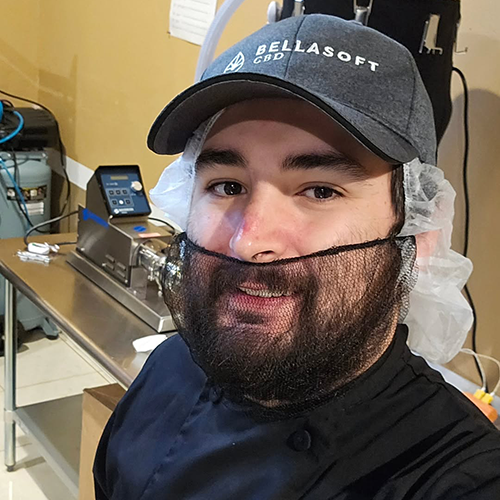
Carl Clouse
Founder Bellasoft CBD
Carl Clouse is the founder and visionary behind Bellasoft CBD, a brand dedicated to providing high-potency, research-backed cannabinoid formulations for individuals facing chronic conditions, disabilities, and other health challenges. With a background in business administration and management from California State University, Fresno, Carl initially pursued a career in aviation but ultimately found his true calling in wellness and entrepreneurship.
His journey into the world of cannabinoids was deeply personal—rooted in love, necessity, and a relentless pursuit of better solutions. The inspiration behind Bellasoft CBD came from Carl’s late grandmother, Doña Paula (Mama Paula), who suffered from dementia. Conventional medications left her unresponsive, stripping away her personality and vitality. Desperate to improve her quality of life, Carl researched cannabinoids, discovering their potential benefits for neurodegenerative diseases. After trying store-bought products with little success, he developed his own high-potency formulations. These products helped his grandmother regain her appetite, drink water, and communicate more clearly.
This experience led Carl to develop Bellasoft CBD, focusing on scientifically backed formulations tailored for individuals with severe ailments. His business background helped him structure Bellasoft around transparency,
potency, and real-world efficacy. His mission is to ensure others can access affordable, high-quality cannabinoid products that improve lives.
Why Cannabis Should be Descheduled
Cannabis remains a Schedule I drug under the Controlled Substances Act (CSA), meaning the federal government considers it to have no accepted medical use and a high potential for abuse.
This classification is scientifically outdated, legally inconsistent, and harmful to public health and economic growth. Here’s why cannabis should be descheduled entirely:
1. Cannabis Has Well-Documented Medical Benefits:
– The National Academies of Sciences, Engineering, and Medicine (NASEM) concluded that cannabis effectively treats chronic pain, chemotherapy-induced nausea, and multiple sclerosis-related muscle spasms.
– The FDA has approved cannabis-derived medications such as Epidiolex for epilepsy.
– Research suggests cannabis has neuroprotective properties beneficial for Alzheimer’s, Parkinson’s, and multiple sclerosis.
2. Cannabis Is Safer Than Schedule II and III Drugs:
– Unlike opioids, which cause over 80,000 deaths per year, cannabis has zero recorded fatal overdoses.
– The addiction rate for cannabis (9%) is significantly lower than opioids (21-29%) and alcohol (15%).
– States with legal cannabis have seen reductions in opioid overdose deaths.
3. Criminalization Has Fueled Injustice and Wasted Resources:
– Over 20 million cannabis-related arrests since 1980 have disproportionately impacted marginalized communities.
– Billions of taxpayer dollars are wasted enforcing cannabis prohibition instead of addressing violent crime.
– The legal cannabis industry has created over 428,000 jobs, but federal prohibition continues to stifle research and banking access.
4. Rescheduling Is Not Enough—Descheduling Is the Only Solution:
– Rescheduling would keep cannabis under federal control, restricting access and innovation.
– Big Pharma could monopolize the industry, making natural cannabis harder to access.
– Descheduling would allow states to regulate it like alcohol and tobacco.
5. Economic and Public Health Benefits of Legalization:
– The legal cannabis market exceeded $33 billion in sales in 2023.
– States have generated over $15 billion in tax revenue from cannabis sales.
– Descheduling would allow banking access, tax benefits, and expanded research opportunities.
The federal government must acknowledge cannabis’s medical value, eliminate legal contradictions, and allow responsible state regulation.
Scientific Studies Supporting Cannabis Benefits
Here are several peer-reviewed studies from PubMed highlighting the health benefits of cannabis:
1. Chronic Pain Management:
– “Cannabis: are there any benefits?” – This study shows that THC and CBD help in managing chronic pain.
– Link: https://pubmed.ncbi.nlm.nih.gov/33215831/
2. Multiple Sclerosis Symptom Relief:
– “Balancing risks and benefits of cannabis use” – Cannabis-based medicines have been found effective in reducing muscle spasticity in MS patients.
– Link: https://pubmed.ncbi.nlm.nih.gov/37648266/
3. Neurological Disorders:
– “Pros and Cons of Medical Cannabis use by People with Chronic Neurological Disorders” – Cannabis reduces symptoms in MS, Parkinson’s, and ALS.
– Link: https://pubmed.ncbi.nlm.nih.gov/27804883/
4. Patient-Reported Benefits:
– “Therapeutic benefits of cannabis: a patient survey” – A survey found cannabis helps with chronic pain and insomnia.
– Link: https://pubmed.ncbi.nlm.nih.gov/24765558/
5. Inflammatory Conditions:
– “Cannabis, cannabinoids, and health: a review of evidence on risks and medical benefits” – Highlights cannabis’s role in treating inflammatory bowel disease and palliative care.
– Link: https://pubmed.ncbi.nlm.nih.gov/39299947/
Evidence
Summary
Descheduling cannabis is the logical and scientifically supported path forward. It would:
✅ Acknowledge medical benefits
✅ Eliminate legal contradictions
✅ Reduce mass incarceration
✅ Expand research opportunities
✅ Create economic growth
The federal government must end outdated prohibition laws and allow states to regulate cannabis responsibly, just as they do with alcohol. Descheduling is not just about personal freedom—it’s about justice, science, and economic progress.
